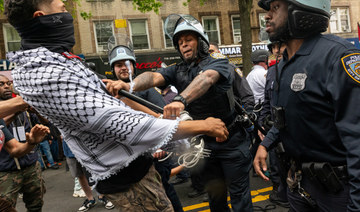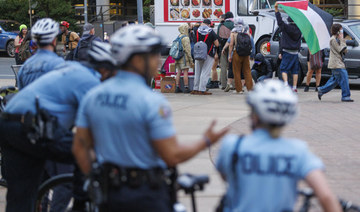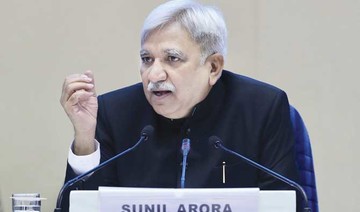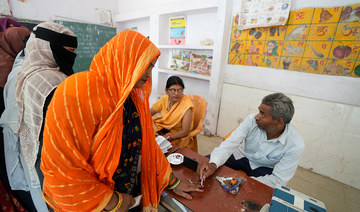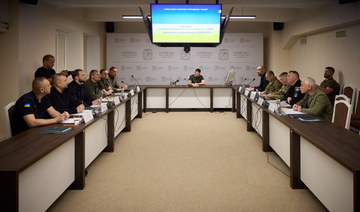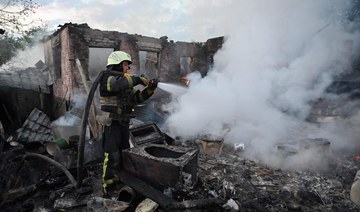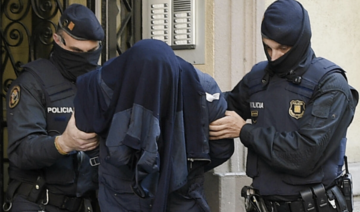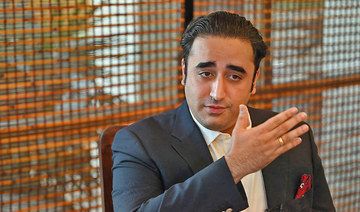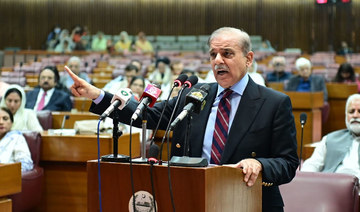BRASILIA/RIO DE JANEIRO: Brazil’s President Michel Temer denied on Thursday that he hosted a meeting in 2010 where an executive of engineering firm Odebrecht SA was asked to arrange an illegal payment of $40 million to his political party.
The graft accusation, which Temer dismissed as “a lie,” was made in plea bargain testimony by Marcio Faria da Silva, a former vice president of the industrial arm of scandal-plagued Odebrecht.
Though potentially damaging to his credibility, and efforts to shore up Latin America’s biggest economy, Faria’s allegation does not threaten Temer’s hold on power. As president, he has temporary immunity for anything that occurred before he took office last year.
The accusation was made public on Wednesday as part of a rash of plea bargain deals by 77 Odebrecht executives caught up in a massive corruption scheme.
Faria said he met with Temer in 2010 in his Sao Paulo legal office, together with former lower house speaker Eduardo Cunha and Congressman Henrique Eduardo Alves, all members of the Brazilian Democratic Movement Party (PMDB).
At the meeting, the payment was requested as a 5 percent levy on a contract Odebrecht was seeking from state oil company Petroleo Brasileiro SA’s for the maintenance of assets in nine countries, Faria said.
Temer confirmed in a video statement posted on social media that he took part in a meeting with a company executive in 2010 but there was no talk of an illegal donation.
“It is a lie that in that meeting I heard any reference to money or any shady dealings between the company and politicians,” the president said.
Earlier on Thursday, Temer’s office confirmed in a separate statement he met with Faria in 2010 in the presence of Cunha for a “quick and superficial” meeting, but denied that Alves participated.
Representatives for Alves and Cunha, who is in prison pending trial on other charges, could not be reached for comment.
The testimony by Faria was among dozens of plea bargain testimonies released by Supreme Court Justice Luiz Edson Fachin.
Based on the testimony, Fachin ordered investigations into nearly 100 politicians as part of the Operation Car War probe into billions of dollars in bribes and illegal kickbacks on contracts with state companies, particularly Petrobras.
The allegations come as Temer is trying to push an overhaul of Brazil’s pension system through Congress, part of a business-friendly agenda that has sparked a rise in Brazil’s stockmarket and currency. Congress is due to start discussions of the reform next week.
Some lawmakers on Thursday said the government would look to speed up the passing of reforms now that so many politicians were under investigation, but admitted that such a move might prove difficult.
In his testimony, Faria alleged that, while Temer did not speak about any figures, Cunha made it clear that a payment was expected.
“He explained that we were seeking a contract with Petrobras. A commitment that it would be signed would require a very important contribution to the party,” Faria said, adding it was clear that a bribe was being sought.
Once the contract was won, the payment was made in cash in Brazil and to foreign bank accounts, Faria said. He said the PMDB took 4 percent of the value of the contract, leaving 1 percent for the left-leaning Workers Party of then-President Luiz Inacio Lula da Silva.
Odebrecht’s former Chief Executive Marcelo Odebrecht, currently jailed for his part in the Car Wash scheme, said in a separate plea bargain deal that he had made available $40 million to Lula. He said the payment was negotiated via a minister, not with Lula himself.
Lula also denied any wrongdoing on Thursday while hinting that he was gearing up for presidential elections next year, despite five court cases pending against him related to Operation Car Washington
Elected as Brazil’s first working class president in 2002 and returned to office four years later, Lula is ahead in opinion polls for the 2018 vote.
“I will fight if they let me fight and I will prove that this country can be happy again,” Lula said, adding that “plea bargains have to be proved.”
Brazil’s Temer calls $40 mln Odebrecht bribe accusation ‘a lie’
Brazil’s Temer calls $40 mln Odebrecht bribe accusation ‘a lie’

Polish students occupy top universities to cut ties with Israeli academia
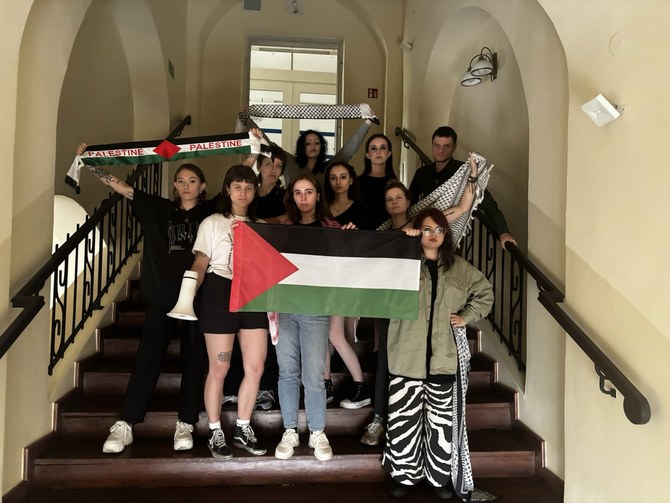
- Students set up encampments at the University of Warsaw and Jagiellonian University
- ‘We consider opposing genocide as our highest obligation,’ students say
WARSAW: Polish students have joined the global movement to end partnerships with Israeli institutions and were occupying the country’s top campuses on Saturday because of Israel’s war on Gaza.
Students and alumni of 12 universities in Poland have been calling on their management to publicly disclose which Israeli academia, research centers, organizations and companies they have been cooperating with and in what scope.
In open letters to rectors, they demanded that the universities “boycott Israeli institutions at the national and international level until the occupation of Palestine ends, recognize the right of Palestinians to equality and self-determination, and recognize the right of return for Palestinian refugees.”
As no action followed from university authorities, on Friday evening they set up encampments at the campuses of the University of Warsaw — the country’s largest academic institution — and of the Jagiellonian University — the oldest and most prestigious.
In a joint manifesto, the protesters said: “We will occupy the university space with our own bodies to demand action ... we consider opposing genocide as our highest obligation.”
Israeli airstrikes and ground offensives in Gaza have since October killed 36,000 Palestinians with more than 80,000 wounded, the vast majority children and women. Many have lost their lives as most of the hospitals have been flattened by bombardment and no medical assistance could reach them.
Protesting students say that failing to oppose the onslaught would mean tacit consent — and complicity.
The University of Warsaw is linked through a research project to the Ben-Gurion University, whose Homeland Security Institute partners with the biggest Israeli arms manufacturers such as Elbit Systems, Rafael Advanced Defense Systems and the Israeli Ministry of Defense. It is also linked to the University of Haifa, which runs special programs for Israeli forces and intelligence.
“As a student, I feel I should have a say in what our university is investing and what its partners are. We know that the university is tied to the Israeli army, forces and apartheid system,” Agnieszka, a sociology student and one of the coordinators of the strike at the University of Warsaw, told Arab News.
“That’s why I’m here ... I hope it will change something.”
Agnieszka was speaking from behind the university gate, which has been locked since Friday evening as campus authorities sealed all entry points, preventing anyone from leaving or getting inside.
People were coming to the gate and the campus fence to bring the students water, food and power banks, and to show support.
While no one could join their encampment anymore, the dozens of students gathered inside believed they could bring change.
“We’ve been protesting since October against the genocide that is occurring in Gaza, and now we’re sort of bringing it closer,” said Nena, who studies at the Faculty of Philosophy.
“We have more direct impact on the institutions we are part of.”
At the same time, 300 km away, students of the Jagiellonian University in Krakow were also locked up at their campus, posing the same demands as those in Warsaw, and vowing that they “will not be indifferent, will not be silent, will not be passive,” as they called for others to join.
“It’s important for me to be here,” Gabriela, an international relations student told Arab News from the Krakow protest site. “It’s important to show solidarity with other encampments around the world, so that authorities can’t ignore our demands any longer.”
The University of Warsaw and the Jagiellonian University have not engaged in any discussions with the protesters. Neither university commented on whether it would agree to the students’ demands. The spokesperson of the Jagiellonian University said that to “ensure the safety of the strike participants,” there was a person “appointed to monitor the situation.”
Millions of Indians beat extreme heat to cast votes
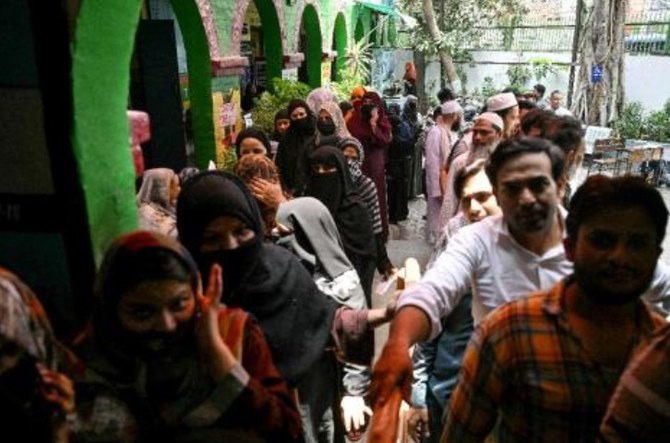
- 111 million people vote in election’s penultimate phase
- Temperature in New Delhi soared to more than 44 degrees Celsius
NEW DELHI: Voters in Delhi braved a sweltering heatwave on Saturday as they queued at polling stations in the penultimate phase of India’s general election.
The voting, which more than 968 million people have been eligible to do, started on April 19. Some of India’s 28 states and eight federally governed territories completed the process in a single day, while others have spread it out.
The sixth phase of the poll covered the capital, Delhi, as well as the neighboring states of Haryana and Uttar Pradesh, Jharkhand, Odisha, West Bengal and Bihar in the country’s east, and Jammu and Kashmir.
In Delhi, voters queued to cast their ballots despite the temperature soaring to over 44 degrees Celsius — with humidity making it feel like 56 C, according to reports — prompting the Election Commission to deploy paramedics to some polling stations.
While there have been concerns over voter turnout — with the first phase estimated to have seen at least 4 percent fewer people take part than in 2019’s election — those who arrived to cast their votes said there was no way the heat could deter them.
“Voting is the only way we can convey our feelings toward governance. It is a decisive way. To spend one hour in the line after five years is not a big deal for us,” said Karan Sharma, who was voting in the East Delhi constituency.
“We were complaining about the heat, but ... it’s a duty, it’s like eating food. After every five years, the festival comes, we have to participate in it.”
For Kavita Wadhwa, who cast her vote in the New Delhi constituency, it was a matter of exercising her rights.
“We have the right to select our own leaders,” she told Arab News. “It’s important for us ... It’s a democratic country.”
The election sees Prime Minister Narendra Modi chasing a third straight five-year term in power, targeting 400 of the 543 parliamentary seats for the National Democratic Alliance led by his Hindu nationalist Bharatiya Janata Party, which has been in power since 2014.
He is challenged by an alliance of two dozen opposition parties — the Indian National Developmental Inclusive Alliance (INDIA), led by the Congress Party, which ruled the country for close to 45 years following its independence in 1947.
Modi’s key contender is Congress leader Rahul Gandhi, the son of Rajiv Gandhi, a grandson of Indira Gandhi, and a great-grandson of Jawaharlal Nehru — all of whom were prime ministers of India.
Gandhi also cast his vote in Delhi on Saturday, after which he took to social media to encourage others to follow suit.
“Your vote will not only improve your life but will also protect democracy and the Constitution,” he said on X. “Come out of your homes in large numbers and vote for your rights and the future of your family.”
Around 111 million people were eligible to vote in the sixth phase of the election. Some of them, like Arohi Anand, were voting for the first time.
“I think it’s a great right ... The government is for us — if we don’t vote, it is on us,” he told Arab News. “(The heat) is a secondary thing. The most important thing is our vote, because the government is the most important thing; it will shape our future.”
The party or coalition that wins at least 272 of the 543 contested seats in the lower house of parliament will form the government.
The first five phases of the election have already decided the fate of 429 representatives. Saturday’s vote will add another 58.
The seventh and final phase of the election will be held on June 1. Vote counting will take place on June 4.
Russian strike on Kharkiv hardware store kills two: official
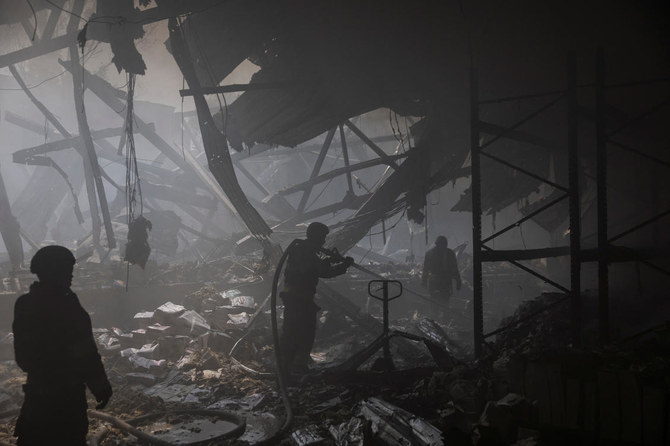
- Kharkiv regional governor Oleg Synegubov said that “two Russian guided bombs hit a construction hypermarket“
- Videos posted by witnesses on social media showed a huge column of black smoke billowing into the sky from the Epitsentr store
KYIV: A Russian strike on Saturday hit a store selling building materials in the eastern Ukrainian city of Kharkiv, killing at least two people, its mayor said.
“We know for sure about two dead,” Kharkiv mayor Igor Terekhov wrote on Telegram, saying that according to preliminary information the strike hit a hypermarket for construction materials in a residential area.
Kharkiv regional governor Oleg Synegubov said that “two Russian guided bombs hit a construction hypermarket” and “a fire broke out over 15,000 square meters.”
Videos posted by witnesses on social media showed a huge column of black smoke billowing into the sky from the Epitsentr store, located in an area of large stores beside a car park. The chain of hypermarkets sells household and DIY goods.
“We have a large number of people missing. There are many wounded,” Terekhov wrote on Telegram.
“Apparently, the attack was on a shopping center where there were many people — this is pure terrorism.”
The city of Kharkiv, Ukraine’s second largest, regularly comes under attack from Russian missiles.
Strikes on the city killed at least seven people on Thursday, local authorities said.
Russia launched a ground offensive in the northeastern Kharkiv region on May 10, but Ukraine said Friday that it had managed to halt its progress.
British man charged after allegedly joining Syrian terror group
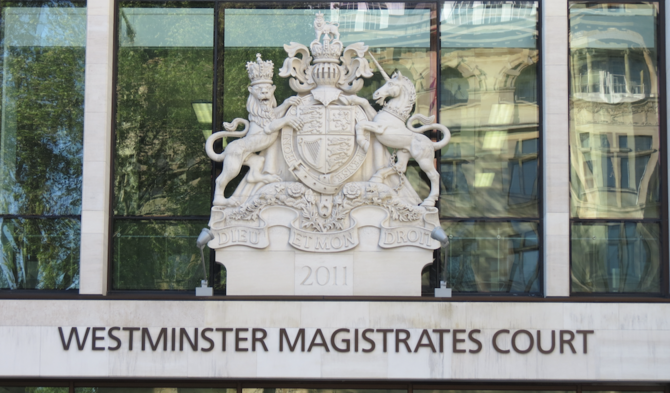
LONDON: A British man who allegedly travelled to Syria to fight for the Jaish Al-Fatah group has been charged with terrorism offences, the Metropolitan Police said on Saturday.
Isa Giga was arrested after arriving in London aboard a flight from Turkey on Thursday.
He was due to appear at Westminster Magistrates’ Court on Saturday. He is suspected of traveling to commit acts of terrorism.
“We have been clear for some time now that should anyone return to the UK whom we suspect of being involved in any terrorist-related activity overseas, then they can expect to be thoroughly investigated,” Commander Dominic Murphy, head of the force’s Counter Terrorism Command told the BBC.
“We work very closely with other partners and agencies here in the UK and overseas in order to do this and help keep the public safe.”
A mob in Pakistan burns down a house and beats a Christian over alleged desecration of Qur’an
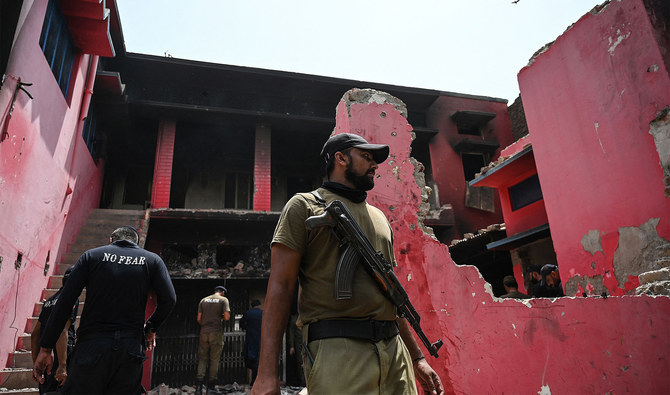
- The incident occurred Saturday in the Mujahid Colony residential area in Sargodha
- Police quickly responded and saved the lives of the two men
LAHORE: Hundreds of Muslims in eastern Pakistan went on a rampage over allegations that a Christian man had desecrated the pages of Islam’s holy book, ransacking and burning his house and beating him before police officers rescued the man and his father, officials said.
The incident occurred Saturday in the Mujahid Colony residential area in Sargodha, a city in Punjab province, said district police chief Ijaz Malhi. He said police quickly responded and saved the lives of the two men.
Malhi said the situation was under control and officers were investigating the allegations.
The incident brought back memories of one of the worst attacks on Christians in Pakistan in August 2023, when angry mobs burned churches and attacked dozens in Jaranwala, a district in Punjab province. Muslim residents claimed they saw a Christian and his friend tearing out pages from a Qur’an and throwing them on the ground. No one was killed. In 2009, six Christians were killed and some 60 homes burned down in the district of Gojra in Punjab following allegations of insults to Islam.
Malhi said police on Saturday dispersed the crowds and were also seeking help from religious scholars to defuse tensions. The Punjab government condemned the attack.
The man’s small shoemaking factory was also burned down, Malhi said.
Blasphemy accusations are common in Pakistan.
Under the country’s blasphemy laws, anyone found guilty of insulting Islam or Islamic religious figures can be sentenced to death. While no one has been executed for blasphemy, often just an accusation can cause riots and incite mobs to violence, lynching and killings.


